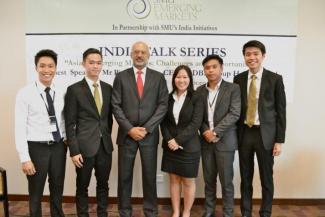
SMU Emerging Markets, in collaboration with SMU’s India Initiatives, organised a talk with Mr Piyush Gupta, Chief Executive Officer, DBS Group Holdings Ltd, on “Asia’s Emerging Economies: Challenges and Opportunities” on 11 March 2014. With an attendance of more than 70 people, ranging from SMU students and faculty to members of Singapore’s business community, the session was both engaging and insightful.
Mr Gupta divided his talk into two broad sections – a discussion on mega-trends in Asia and the short-term outlook of Asia. He began by comparing the growth in Asia to that of the West, with the former performing much better over the last 20 years. He also elaborated on the four main drivers of the Asian growth story. He outlined interesting trends in consumption patterns as one such driver, citing the rising middle class in Asia as being a factor for the growth. Additionally, the emergence of several high net-worth individuals, especially in China, has led DBS to look at further expansion in the wealth management sector.
He also spoke about the increase in investment required by Asia as well as the growth in exports from the region. While discussing Asia’s need for US$8 trillion in investments, he stressed on the need for suitably developed Bond markets. This would help meet Asia’s financing needs, which arose largely from rapid urbanisation in countries like China and India. On the topic of increasing exports, Mr Gupta focused on both intra-Asia trade as well as the further integration of Asia with the global economy. At the same time, he touched on the volatility that is inherent in emerging markets, especially the instabilities in the financial sector.

[Photo: Mr Gupta sharing his insights with the participants who comprised SMU students as well as members of Singapore’s business community.]
Referring to the Asian Financial Crisis of 1997, Mr Gupta felt that it is not likely to recur soon, given the stronger foreign exchange and banking system we have today. However, ‘shallow’ markets did make for a volatile system.
On the subject matter of China, he spoke about the persistent under-consumption and over-capacity, and felt that rising debt levels could be a concern in China, especially given the vulnerabilities emerging from the shadow banking system. Zooming in on Indonesia, Mr Gupta noted the consistency in growth rate as well as the need for reforms from the incumbent government. However, he stressed that nowhere in Asia were the upcoming elections more crucial than in India. He opined that the country has suffered from widespread policy paralysis which has adversely affected its growth. While providing his insights on China, Indonesia and India, Mr Gupta mentioned that the ASEAN was not really a ‘game-changer’, with the region having already achieved many of its economic objectives.
[Photo: Mr Gupta sharing his views on the various investment opportunities in emerging markets during the Q&A session. Next to him is second-year business student Noshir Engineer, who is also an analyst at SMU Emerging Markets.]
During the discussion session, Mr Gupta fielded a range of questions, including financing Asia’s infrastructure, the need for greater Asia’s savings to remain within the region, as well as for an organisation like the World Bank to stimulate investment in the region. Mr Gupta also shared his thoughts on the role of a bank beyond profits and provided some insights to students planning to enter the financial industry.
Mr Gupta’s session provided a candid and fascinating snapshot of Asia’s economies in 2014 and the likely trends in the key markets.
[Featured Photo: SMU students from SMU Emerging Markets Organising Committee – Matthias Lim (1st from left), Kenneth Quek (2nd from left), Linda Mulyani (3rd from right), Gary Lee (2nd from right) and Shaun Cheong (right) – with Mr Piyush Gupta (3rd from left), CEO, DBS Group Holdings Ltd.]